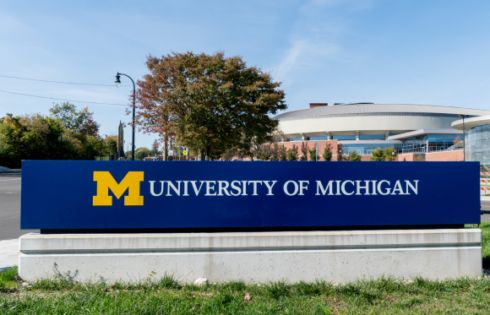
Attorney: ‘Colleges probably think it is cheaper to expel some innocent people than risk an investigation by [Office for Civil Rights]’
A false rape accusation against former University of Michigan student Drew Sterrett cost the young man three years of his life.
In Sterrett’s case, the University of Michigan recently settled a lawsuit he had filed against the school after it kicked him out for an alleged sexual assault in 2012. Evidence illustrated the act was consensual, and that the university denied Sterrett his due process rights to defend himself.
Part of the settlement cleared Sterrett’s record of all wrongdoing, but he may also never return to the University of Michigan as a student, nor press charges against the female who had lodged the flimsy complaint, according to a copy of the settlement obtained by The College Fix.
“It really was emotionally difficult, debilitating and crushing at times,” Sterrett told Slate, adding he is now filled with “a sense of excitement and joy.”
The outcome of Sterrett’s case has been heralded by some as a prime example of how universities across the nation overzealously and wrongly adjudicate sexual assault claims due to pressure from the Department of Education’s Office for Civil Rights.
There are dozens of lawsuits similar to Sterrett’s pending – 86 lawsuits and counting. This increase can be traced back to onerous oversight by the U.S. Education Department’s Office for Civil Rights, which enforces Title IX, some have argued. Currently more than 100 institutions are under review by the office over the handling of sexual violence and harassment complaints.
“[C]olleges probably think it is cheaper to expel some innocent people than risk an investigation by [the Office for Civil Rights],” former Education Department attorney Hans Bader said in an email to The College Fix.
In 2014, President Barack Obama established a task force within the office with a mandate to strengthen federal enforcement efforts to combat sexual assault on campuses.
“All colleges and universities and K-12 schools receiving federal funds must comply with Title IX,” the feds warned administrators. “Schools that violate the law and refuse to address the problems identified by OCR can lose federal funding or be referred to the U.S. Department of Justice for further action.”
As a result, according to Slate’s Emily Yoffe, the Office for Civil Rights “has mandated that institutions of higher education create a quasi-criminal justice system to deal with alleged sex crimes, a task ill-suited to college and university administrators. The system isn’t working for anyone, as the Michigan case amply demonstrates.”
“President Obama has made campus sexual assault a signature issue,” she added. “Before the president’s second term ends, he would do well to take a long, hard look at the rules and procedures his administration has put in place. A system that cuts short the educations and damages the futures of young men like Drew Sterrett is not a just one.”
Bader, in an email to The College Fix, said part of the problem stems with the Office for Civil Rights’ interpretation of Title IX.
“OCR’s interpretation of Title IX contributed to the climate that produced the unjust expulsion in the Sterrett case, but its interpretation did not directly require his expulsion,” Bader stated. “If the university had found him not guilty, OCR would likely not have found it in violation of Title IX based on that conclusion (assuming the university explained its decision and the evidence that supported it).”
“However, some universities are expelling innocent people,” he added, citing a piece he wrote in the Examiner headlined: “Education Department harms the innocent by rewarding false complaints of abuse.”
The Education Department, where I used to work, is becoming more and more extreme in how it misinterprets and misapplies federal law. For example, the Education Department has thumbed its nose at federal court rulings by wrongly creating entitlements for people who make false discrimination and harassment complaints—even though such baseless complaints can make life miserable for the victims of such false allegations (and cause serious problems for the institution they work for or attend).
Federal judges have ruled that people who lie and file sexual harassment charges over conduct they falsely claim was unwelcome can be disciplined, in cases such as Vasconcelos v. Meese (1990). But in a recent Title IX investigation of Michigan State University, the Education Department required university officials to offer “remedies” to “Student A,” whom both it and the University found had made a false allegation of sexual assault against two students.
Bader said for university administrators, it may come down to the path of least resistance.
“This is probably because they might have to spend tens of thousands of dollars worth of time justifying their decision not to expel such innocent people in response to an investigation by OCR,” Bader said in his email. “These colleges probably think it is cheaper to expel some innocent people than risk an investigation by OCR.”
In light of the Sterrett settlement, the female student who had accused him critiqued the university’s process of adjudicating her claim.
“I caution all University of Michigan students and their parents to avoid reporting sexual violence or using the university’s Title IX process at all costs,” the female student said in a statement, according to The Detroit Free Press.
“It’s ironic for her to criticize a policy that was so slanted in her favor that the university had to settle a lawsuit brought over the way it was applied against the person she accused,” Bader said. “She got the accused kicked out of the University of Michigan based on very weak evidence.”
The university responded to the female student’s statement, saying students should still report sexual assault.
“We firmly believe that accessing resources for information and support is a vitally important first step for anyone who has experienced sexual misconduct,” UMich spokesman Rick Fitzgerald told The Fix. “Our students have a number of options for seeking support, including strictly confidential resources.
Like The College Fix on Facebook / Follow us on Twitter
IMAGE: Shutterstock





Please join the conversation about our stories on Facebook, Twitter, Instagram, Reddit, MeWe, Rumble, Gab, Minds and Gettr.